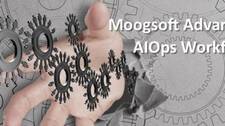Upgrade & Secure Your Future with DevOps, SRE, DevSecOps, MLOps!
We spend hours on Instagram and YouTube and waste money on coffee and fast food, but won’t spend 30 minutes a day learning skills to boost our careers.
Master in DevOps, SRE, DevSecOps & MLOps!
Learn from Guru Rajesh Kumar and double your salary in just one year.
Source:- devops.com
Moogsoft is moving to make it easier to create custom workflows around its AIOps platform while expanding the number of integrations provided to include connectors to New Relic Insights, Microsoft Teams and proxy support for polling integrations with IT platforms Zenoss, Zabbix, vCenter, vSphere, Solarwinds, Spectrum and SevOne.
Gabe Coelho-Kostolny, senior product management and product marketing leader at Moogsoft, said a Workflow Engine that has been added to version 7.2 of the Moogsoft AIOps platform makes it possible to trigger actions such as notifications, ticket creation and other automated tasks within Moogsoft and external systems. Those actions can be employed within incident management workflows ad other automated remediation tools, he said.
Moogsoft has also added tools that make it possible to visualize alert clustering algorithms in real time and, if needed, fine-tune them. That capability is intended to provide IT operations teams with more confidence in the recommendations being generated by the AIOps platform, Coelho-Kostolny said.
Finally, Moogsoft is making available an analytics dashboard dubbed Individual Statistics, which enables managers to drill down from the team level to better understand the workload and key performance indicators of each team member.
Coelho-Kostolny noted there is already a high correlation between organizations that have adopted best DevOps practices and those moving to implement AIOps. The complexity of many DevOps environments is in many cases forcing the AIOps issue because all the alerts being generated creates a level of fatigue among human IT administrators that results in them not being able to keep pace with the overall rate of change, he said. The concern now is no longer so much whether human IT administrators will be replaced by artificial intelligence (AI) as much as it is enabling IT teams to stay on top of all the tasks required. The opportunity now, he said, is to make it easier for organizations that have embraced DevOps to also customize the AIOps platform.
Of course, AIOps platforms presuppose that IT organizations have access to massive amounts of accurate data about the IT environment. Collecting that data often winds up being a bigger challenge than most organizations appreciate. In general, Coelho-Kostolny said it’s clear AIOps platform adoption is reaching a tipping point in the enterprise. Organizations, however, need to be careful distinguishing between what is truly artificial intelligence and what may be simply a rules-based engine that has been added to an existing IT service management (ITSM) platform, Coelho-Kostolny said.
Regardless of the AI path chosen, the ongoing shortage of IT expertise with critical skills means organizations will continue to experiment with AI. The real issue is determining to what degree of confidence IT teams will have in those AI platforms. After all, if the assumptions an AI system is relying on to make a recommendation prove faulty, the potential for harm tends to be a lot greater than any mistake a single human IT administrator might ever make on their own.

 Starting: 1st of Every Month
Starting: 1st of Every Month  +91 8409492687 |
+91 8409492687 |  Contact@DevOpsSchool.com
Contact@DevOpsSchool.com